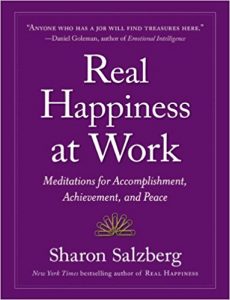Work stress. We all feel it, whether we’re struggling to find 15 minutes for lunch or responding to emails at 10 p.m. But a regular mindfulness and meditation practice can help, says meditation teacher Sharon Salzberg, author of Real Happiness at Work.
“Sometimes people are really concerned about practicing mindfulness at work. They think they’ll lose their edge, or they won’t strive or seek excellence, but it actually opens up the door to being more creative and finding a sense of meaning,” she explains.
Here are 6 ways that meditation and mindfulness can help you both survive and enjoy your work day, according to Salzberg.
1. Find a sense of meaning.
Studies have shown that strongest indicator of happiness at work is a sense of meaning, so Salzberg recommends infusing your day with something that gives you personal meaning. For example, say to yourself, “I will try to be compassionate to everyone I encounter” or “I will try to communicate well,” she suggests. This positive focus can really transform your day, she says.
2. Be realistic.
We’ve all had moments when we wanted to march out the door, but since the bills aren’t going to pay themselves, it’s important to be realistic, Salzberg says. Ask yourself, “What do you see as a realistic path to change in your situation?” she says. “See what you can change, and see what’s actually happening (without focusing on your immediate reactions). Focus on the bigger picture. Even if you’re seeking change, doing so from a less driven, less reactive place is a good thing.”
3. Have a daily meditation practice.
“It’s not realistic to be mindful all the time at work,” Salzberg says. “One of my teachers once recommended ‘short moments many times’ … that’s sort of our goal. The best and most effective way to make that real is if you have a daily meditation practice—10–20 minutes a day of sitting or walking meditation. A dedicated period where you’re only trying to cultivate awareness and compassion. That will make it so much easier to have those short moments many times a day.”
4. Come back to your breath.
If you’ve received an upsetting email or had a tense moment with your boss, remember to breathe, Salzberg advises. “If you breathe and come back to the moment, it brings you back to your values and what you really want to see come out of the situation. It’s actually a very powerful thing to do,” she says.
5. Unplug.
If you’re checking your work emails first thing in the morning and last thing at night, mindfulness and meditation can help you unplug, Salzberg says. “The more aware we get, the more we see the consequences of certain actions. You realize that you need to take a break—you feel the stress in the body and you feel compassion for yourself. This helps you put down your device, establish new boundaries and new habits.”
6. Shift your perspective.
Meditation and mindfulness can help you remember that work is only one aspect of your life and only one part of your day, Salzberg says. “Meditation and mindfulness have a benefit of perspective-taking and giving you more flexibility of mind. You’re purposefully, intentionally asking yourself, ‘How else can I look at things?’ Have fun with it. See your very life and your day as a creative medium.”
How to Meditate
Salzberg recommends 10–20 minutes a day of sitting or walking meditation. To do this, she suggests resting your attention on the feeling of the breath, and when the mind wanders, be kind to yourself, see if you can gently let go of the distraction and bring your attention back. “This is really, really important—the ability to let go and come back without a lot of blame and resentment,” she says, explaining that cultivating this skill can help us do the same thing to cope with and let go of work stress.
From: Yoga Journal




